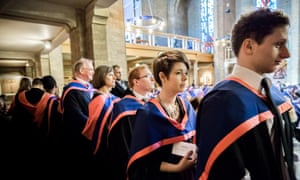
No black academics have worked in senior management in any British university for the last three years, according to employment records.
Figures published by the Higher Education Statistics Agency record no black academics in the elite staff category of “managers, directors and senior officials” in 2015-16 – the third year in a row that this has happened.
Among the 535 senior officials who declared their ethnicity, 510 were white, 15 were Asian and 10 were recorded as “other including mixed”. Thirty senior academics either refused or failed to record an ethnicity.
The figures also show universities employ more black staff as cleaners, receptionists or porters than as lecturers or professors.
David Lammy, the Labour MP for Tottenham and a former higher education minister, said: “This is absolutely shocking. I am appalled that higher education is so deeply unrepresentative of the country.
“Universities talk about widening participation and fair access but the complete lack of diversity in senior positions sends out an absolutely dreadful message to young people from ethnic minorities who find themselves wondering whether university is for them or not.”
In 2012-13 Hesa said five black staff were recorded in the most senior category – although the actual figure could vary between three and seven under its rounding policy.
The 2015-16 figures show universities employed 3,205 black people as academics, 1,805 in secretarial roles and 1,410 in “elementary occupations”, including cleaners, porters and security guards.
They had 158,000 white staff in academic posts and fewer than 70,000 performing clerical or manual labour.
Nicola Dandridge, the chief executive of Universities UK, said: “We recognise that there is a serious issue with the lack of black representation among senior staff in universities. The evidence is clear that black and minority ethnic staff continue to be underrepresented at senior levels in higher education.”
Dandridge said her organisation supported the work of the Equality Challenge Unit, which reported last year on how to encourage black and minority ethnic (BME) academics to stay in UK higher education.
“We need to acknowledge and nurture the talent of our BME academics, and encourage those who have left to return,” Dandridge said.
The figures cover staff at 163 of the UK’s state-funded higher education institutions and the privately funded Buckingham University.
The agency that collects the data said it had a policy of rounding down entries of two or fewer to zero, meaning that Valerie Amos, who took over as director of Soas University of London in September 2015, would not show up in the figures if she identified as black.
The figures paint a picture of academia as heavily dominated by white people and, in the upper echelons, overwhelmingly male. In 2015-16 women made up less than a quarter of the 20,000 professors currently working in UK higher education, although that represented an improvement on previous years.
While women made up 45% of academic staff, and 48% of staff overall, around two-thirds of women were employed on part-time contracts.
The potential impact of Brexit on British universities was also underlined by the figures, which show that 17% of academic staff came from European Union countries outside the UK. Another 12% came from outside the EU.
[Source:- Gurdian]




